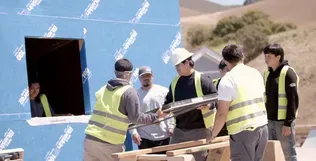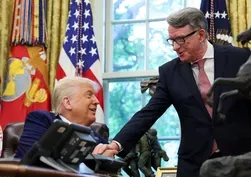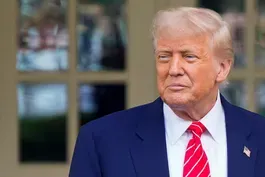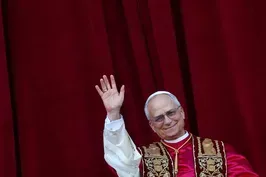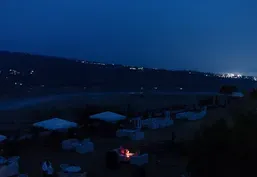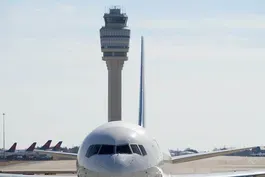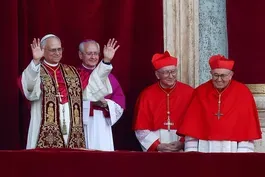
Bill Gates on why he's donating his remaining wealth
Clip: 5/8/2025 | 11m 5sVideo has Closed Captions
Bill Gates on why he's donating his remaining wealth and his concerns about U.S. aid cuts
Billionaire Bill Gates announced a major change to his philanthropic Gates Foundation. There will be a doubling of its giving, to more than $200 billion over the next 20 years, when the foundation will close permanently. The move comes at a moment of significant cuts to foreign aid from the U.S. and other nations. Amna Nawaz discussed more with Gates and foundation CEO Mark Suzman.
Problems with Closed Captions? Closed Captioning Feedback
Problems with Closed Captions? Closed Captioning Feedback
Major corporate funding for the PBS News Hour is provided by BDO, BNSF, Consumer Cellular, American Cruise Lines, and Raymond James. Funding for the PBS NewsHour Weekend is provided by...

Bill Gates on why he's donating his remaining wealth
Clip: 5/8/2025 | 11m 5sVideo has Closed Captions
Billionaire Bill Gates announced a major change to his philanthropic Gates Foundation. There will be a doubling of its giving, to more than $200 billion over the next 20 years, when the foundation will close permanently. The move comes at a moment of significant cuts to foreign aid from the U.S. and other nations. Amna Nawaz discussed more with Gates and foundation CEO Mark Suzman.
Problems with Closed Captions? Closed Captioning Feedback
How to Watch PBS News Hour
PBS News Hour is available to stream on pbs.org and the free PBS App, available on iPhone, Apple TV, Android TV, Android smartphones, Amazon Fire TV, Amazon Fire Tablet, Roku, Samsung Smart TV, and Vizio.
Providing Support for PBS.org
Learn Moreabout PBS online sponsorshipAMNA NAWAZ: Billionaire Bill Gates announced today a major change to his philanthropic Gates Foundation, a doubling of their giving to more than over $200 billion over the next 20 years, when the foundation will close its doors permanently in December of 2045.
Gates and then-wife Melinda French Gates created the foundation 25 years ago and have given more than $100 billion since then, dramatically reshaping the global public health landscape.
The announcement comes at a moment of significant cuts to foreign aid from the U.S. and other nations, including to vital programs that fight disease and malnutrition.
Joining me now from New York is Bill Gates and the foundation's CEO, Mark Suzman.
And a note that the Gates Foundation has previously been a funder of the "News Hour."
Gentlemen, welcome to you both.
Thank you so much for joining us.
So, Bill Gates, I want to begin with you.
This doubling down, quite literally, on your philanthropy, giving away virtually all of your wealth over the next 20 years, why this decision and why now?
BILL GATES, Chair, Gates Foundation: Well, as I have contemplated this year, where I'm turning 70 and Microsoft turned 50, and we have had 25 years of amazing work at the Gates Foundation, I thought, why not bet on the team we have and get all the way to elimination for a lot of these diseases?
Our pipeline of innovations is better than ever, whether that's vaccines or using A.I.
to do health delivery.
And so we're going to do as much as we can.
And it's very exciting that we can probably do more good in the next 20 years than the last 25, where we surprised ourselves with how much we were able to achieve.
AMNA NAWAZ: Yes, I do have to ask, because you do have children.
Did any one of them say, are you sure you want to give all this money away?
BILL GATES: Well, my children are very supportive of this work.
They have been -- had a great upbringing.
And I have given them some resources, although, as a percentage of this fortune that I'm lucky to have, not a high percentage.
The vast percentage will and goes to charity.
AMNA NAWAZ: Mark Suzman, and the work done by the foundation over the last generation, among other things, it's helped reduce global childhood deaths from 10 million a year down to five million, helped to save 82 million lives through vaccine support and disease prevention.
But, as you have previously noted, this year, 2025, is the year foreign aid, as you put it, fell off a cliff.
So in this new environment, where specifically will you and the foundation focus to maximize your impact?
MARK SUZMAN, CEO, Gates Foundation: Yes, well, as Bill said, the main decision to actually accelerate the spend-down date and have a new sunset of 2045 was actually a discussion that Bill and I and the board started having well over a year ago, when we were trying to look back and say, where have we had the greatest successes over the last 25 years and how can we have the greatest impact over the next two decades?
And it really was in exactly that area of global health you're talking about.
So, the provision of vaccines for kids was the main reason for that reduction in preventable child mortality.
But we have also seen a halving of deaths in the incidence of HIV/AIDS, of tuberculosis, of malaria, and that we really think, by that 2045 deadline, there's a plausible pathway to actually eradicate some of the diseases, like polio, like malaria, like potentially measles, and bring the other big ones like HIV and T.B.
under control.
But that really does require partnerships.
A big chunk of the success we had in the first two decades was because we did have fellow travelers coming along like the United States and the United Kingdom and France and Germany and others.
And, as you say, rightly, they had already been started to have cutbacks.
And then, this year, we have seen dramatic cuts from both the U.S.
The United Kingdom has cut, announced cuts of 40 percent.
There are cuts elsewhere in Europe.
And so we want to strongly make the case both that you can rely on the Gates Foundation to be a stable, reliable force at the scale we currently pay, and our payout is moving up to $9 billion a year.
And this will allow us to be at $9 billion a year and above for the next two decades.
But we also want to bring those other funders back.
We want to show them that this is the most impactful set of investments they could possibly make to save and improve human lives.
AMNA NAWAZ: Bill, on that point, there is really an assault on foreign aid that we're seeing right now by this administration.
You yourself have called some of those cuts stunning, saying that you didn't expect them.
As you reflect back on the enormous progress made by the foundation, how worried are you about some of that progress being undone, those goals of elimination or eradication not being able to be met because of these cuts?
BILL GATES: Well, we're already seeing the deaths of children go up.
And that's tragic, where after 25 years it's been constantly going down.
Now it's going back up.
And unless we act very, very quickly to reverse this, it will mean millions of additional deaths.
In the end, the Congress has set these budgets.
The Congress was persuaded by President Bush back in the year 2002 to do this PEPFAR for HIV.
It's been very supportive of the vaccines, the Gavi that provides vaccines to the poorest children in the world.
And so they -- the chance is to go to Congress and say, this is only less than 1 percent of the budget.
It's morally beneficial.
It provides stability.
It creates health systems that will help us stop pandemics before they come to the United States.
So there's a lot of justification for this.
And we will make the case.
The cuts have been so far much worse than we'd expected.
AMNA NAWAZ: You seem to be saying you hope that Congress will act to reverse some of these cuts.
We should note you did meet privately with President Trump not long ago, and since then we have seen the dismantling of USAID, dramatic cuts to the CDC and NIH.
Are you continuing to make the case directly to the president?
And is he responsive to your concerns about the impact of those cuts?
BILL GATES: Yes, I have had a long meeting with him in late December and then a short meeting February 5 where I said, hey, some of these cuts are a real problem and are not -- are being mischaracterized.
And so I'm going to continue that dialogue with President Trump and Secretary Rubio.
We're -- this is our full-time work.
So we're -- we want to have that discussion.
And then it'll carry over to what happens with the congressional budget.
AMNA NAWAZ: And, Mark, I guess the big question is, if these cuts continue, is the Gates Foundation in a position to step in and fill the void that's left?
MARK SUZMAN: The sad truth is, no philanthropy, even one of our size and scope, or any combination of philanthropies can possibly fill the gap that's left by the U.S. government and donors.
To put it in perspective, the U.S. total aid last year was around $69 billion.
The USAID's budget was over $40 billion.
Even with our $9 billion a year, that doesn't remotely fill that gap, and we're not even counting the cuts from other countries.
It's also important to stress that we think it's critical that philanthropic capital, which is scarce capital that does enjoy tax advantages, really should be spent on where we see the public sector and the private sector unable to invest.
We can take risks that government cannot take.
So we're investing in -- when Bill talks about that pipeline of innovation, we're investing in the first new T.B.
vaccine in over a century.
We're spending nearly $700 million that, which may succeed, it may fail.
But if it succeeds, it will be transformative.
That's something only we can do.
But then we need government, we need partners like the U.S. government to then help ensure that that vaccine or that new seed for a smallholder farmer to get more productive crops reaches the people who need them.
And so we can do a lot on our own, but we cannot possibly fill the kind of gap that the U.S. government risks leaving if it follows through on these proposed cuts.
AMNA NAWAZ: You know, I also have to ask, because you have for years pushed other wealthy people to give away more of their money.
You backed that Giving Pledge years ago, and many people signed on to it.
Even Elon Musk signed on to it back then, and then, recently, the man who's been pushing for a lot of these cuts, you described to The New York Times as the world's richest man who's now been involved in the deaths of the world's poorest children because of those cuts.
Do you still hold out hope that more wealthy people will follow your lead, when that hasn't been the trend that we have seen?
BILL GATES: Well, philanthropy is going up.
There's 240 people have joined what we call the Giving Pledge, where wealthy people commit to give away the majority of their money.
There's some real standouts in that group, including Michael Bloomberg, who's been successful and also supported us in things like polio and tobacco.
And we were just talking today about more things that we can do together.
Philanthropy is a positive element here.
Even the rich people in many of these countries, like Indonesia and Vietnam and Nigeria, are coming along to partner in these efforts.
But the rich countries, we're asking them for 1 to 2 percent of their money for this.
Without that, we won't be able to achieve our goals.
AMNA NAWAZ: Are you hopeful the rich countries will step up?
BILL GATES: Well, they did step up, and they should be proud of that.
These short-term pressures have us going in the wrong direction.
And I think the moral cause and the other benefits are strong enough, we will see some restoration in the years ahead.
AMNA NAWAZ: Bill Gates and Dr. Mark Suzman, thank you so much for your time.
We really appreciate you joining us.
BILL GATES: Thank you.
MARK SUZMAN: Thank you.
A Brief But Spectacular take on building a brighter future
Video has Closed Captions
Clip: 5/8/2025 | 3m 41s | A Brief But Spectacular take on building a brighter future (3m 41s)
The impact Trump's tariffs are having on supply chains
Video has Closed Captions
Clip: 5/8/2025 | 11m 11s | The impact Trump's tariffs are already having on global supply chains and U.S. businesses (11m 11s)
News Wrap: White House asks to remove deportation protection
Video has Closed Captions
Clip: 5/8/2025 | 6m 15s | News Wrap: White House asks Supreme Court to allow it to remove deportation protections (6m 15s)
Pope Leo XIV becomes first American to lead Catholic Church
Video has Closed Captions
Clip: 5/8/2025 | 2m 38s | Pope Leo XIV selected as first American to lead Catholic Church (2m 38s)
U.S. pushes for de-escalation as India, Pakistan trade fire
Video has Closed Captions
Clip: 5/8/2025 | 2m 58s | U.S. pushes for de-escalation as India and Pakistan trade fire and accusations (2m 58s)
What it will take to update U.S. air traffic control system
Video has Closed Captions
Clip: 5/8/2025 | 5m 22s | What it will take to update the aging U.S. air traffic control system (5m 22s)
What Pope Leo's election means for the future of the church
Video has Closed Captions
Clip: 5/8/2025 | 7m 53s | What Pope Leo XIV's election means for the future of the church and Catholics worldwide (7m 53s)
Providing Support for PBS.org
Learn Moreabout PBS online sponsorshipSupport for PBS provided by:
Major corporate funding for the PBS News Hour is provided by BDO, BNSF, Consumer Cellular, American Cruise Lines, and Raymond James. Funding for the PBS NewsHour Weekend is provided by...
